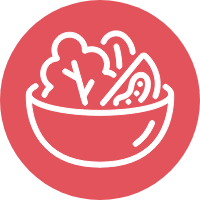- HealthBites for Diabetes Resource Hub
- Calcium: An Essential Nutrient For Your Bone Health
- How To Manage Your Cholesterol Levels
- How To Prevent And Treat Constipation
- How To Manage Your Diet and Health When You Have Diabetes
- How To Manage Diarrhea
- High Blood Pressure and Food Choices
- Everything You Need To Know About Probiotics
- What You Need To Know About Vitamin B12
- How To Manage Gas and Bloating
- Heartburn Relief
- Solutions To Manage Dry Mouth
- Celiac Disease: Gluten-Free Diet
- Osteoporosis Prevention: Keeping Your Bones Healthy
- The Importance of Vitamin C
- What You Need to Know About Folate
- What You Need To Know About Iron
- What You Need To Know About Potassium
- What You Need To Know About Magnesium
- What You Need To Know About Zinc
- What You Need To Know About Vitamin K
- All About Vitamin D
How To Prevent And Treat Constipation

On average, a normal frequency of bowel movement is between three times a day to three times a week. Constipation can be caused by certain medications, diet habits and medical conditions. Minor adjustments in your lifestyle and diet choices can help manage your symptoms. The information on this page provides a number of suggestions for you to try which may improve how you feel.
Symptoms of constipation
The following symptoms often accompany constipation:
- Feeling of abdominal bloating
- Gastrointestinal discomfort
- Gas
- Indigestion
- Decrease in frequency of bowel movements
- Hard and dry stools that are difficult to expel
- Loss of appetite
- Pain or pressure in the stomach (stomach cramps)
- Abdominal discomfort
- Feeling of heaviness
- Rectal bleeding following exertion
What causes constipation?
Constipation can be caused by many things such as:
- A low-fibre diet;
- Hormonal changes (pregnancy, menopause, etc.);
- Fissures, hemorrhoids (or any other problem that makes a person refrain from going to the bathroom);
- Not drinking enough water;
- Lack of exercise and sedentary lifestyle;
- Consuming constipating foods (bread, rice, cheese, etc.);
- Taking medication (laxatives over a long period of time, antidepressants, narcotics, antihypertensive drugs, calcium, iron, etc.);
- Digestive and other diseases (eg. irritable bowel syndrome, Parkinson’s disease, multiple sclerosis, cancer, etc.);
- Psychological issues (stress, depression, anxiety, etc.).
Helpful tips to prevent and manage constipation
- Increase your intake of high fibre foods, for example:
- Wheat bran, ground and whole flax seed, bran cereals, whole grain and whole wheat products, legumes such as beans, peas and lentils, vegetables and fruit with the skin left on
- Add high fibre foods slowly to your diet to avoid gas, bloating, cramps and diarrhea
- Eat prunes, pears or apples which contain natural ingredients that have a laxative effect
- Drink enough fluid each day, at least 9-12 cups:
- Fluid includes water as well as beverages and liquids such as milk, juice, coffee, tea, broth and soup
- Include moderate to vigorous physical activity for at least 150 minutes (2 ½ hours) per week, for example:
- Brisk walking
- Biking
- Swimming
- Water aerobics

Looking for more information about constipation? Speak to your Metro Pharmacist.
The information in this resource is for general information purposes only and is not intended to replace informed medical advice. Consume foods according to any dietary guidelines you have been provided from a health care professional. Metro Ontario Pharmacies Limited assumes no legal liability for the accuracy, completeness or usefulness of the information.










